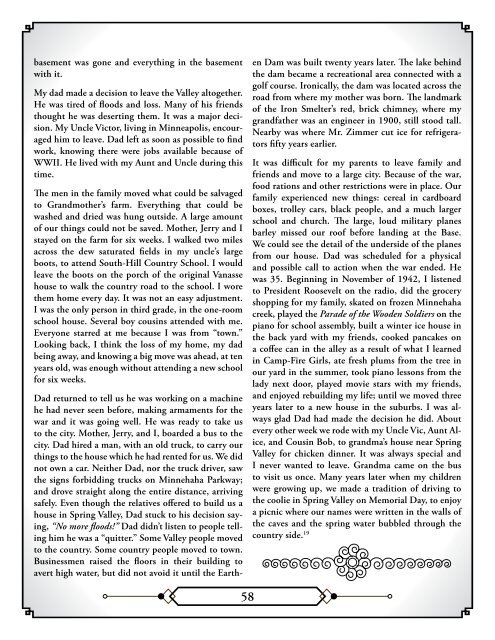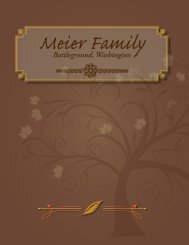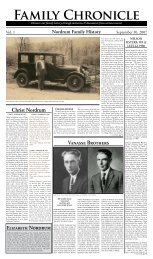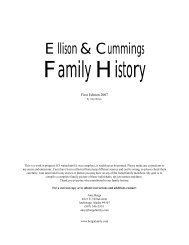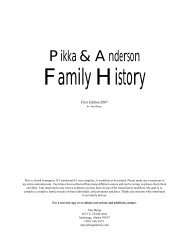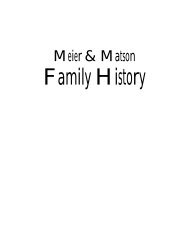Book 2 - Nathan, Amy, Madison and Ethan Berga
Book 2 - Nathan, Amy, Madison and Ethan Berga
Book 2 - Nathan, Amy, Madison and Ethan Berga
Create successful ePaper yourself
Turn your PDF publications into a flip-book with our unique Google optimized e-Paper software.
asement was gone <strong>and</strong> everything in the basement<br />
with it.<br />
My dad made a decision to leave the Valley altogether.<br />
He was tired of floods <strong>and</strong> loss. Many of his friends<br />
thought he was deserting them. It was a major decision.<br />
My Uncle Victor, living in Minneapolis, encouraged<br />
him to leave. Dad left as soon as possible to find<br />
work, knowing there were jobs available because of<br />
WWII. He lived with my Aunt <strong>and</strong> Uncle during this<br />
time.<br />
The men in the family moved what could be salvaged<br />
to Gr<strong>and</strong>mother’s farm. Everything that could be<br />
washed <strong>and</strong> dried was hung outside. A large amount<br />
of our things could not be saved. Mother, Jerry <strong>and</strong> I<br />
stayed on the farm for six weeks. I walked two miles<br />
across the dew saturated fields in my uncle’s large<br />
boots, to attend South-Hill Country School. I would<br />
leave the boots on the porch of the original Vanasse<br />
house to walk the country road to the school. I wore<br />
them home every day. It was not an easy adjustment.<br />
I was the only person in third grade, in the one-room<br />
school house. Several boy cousins attended with me.<br />
Everyone starred at me because I was from “town.”<br />
Looking back, I think the loss of my home, my dad<br />
being away, <strong>and</strong> knowing a big move was ahead, at ten<br />
years old, was enough without attending a new school<br />
for six weeks.<br />
Dad returned to tell us he was working on a machine<br />
he had never seen before, making armaments for the<br />
war <strong>and</strong> it was going well. He was ready to take us<br />
to the city. Mother, Jerry, <strong>and</strong> I, boarded a bus to the<br />
city. Dad hired a man, with an old truck, to carry our<br />
things to the house which he had rented for us. We did<br />
not own a car. Neither Dad, nor the truck driver, saw<br />
the signs forbidding trucks on Minnehaha Parkway;<br />
<strong>and</strong> drove straight along the entire distance, arriving<br />
safely. Even though the relatives offered to build us a<br />
house in Spring Valley, Dad stuck to his decision saying,<br />
“No more floods!” Dad didn’t listen to people telling<br />
him he was a “quitter.” Some Valley people moved<br />
to the country. Some country people moved to town.<br />
Businessmen raised the floors in their building to<br />
avert high water, but did not avoid it until the Earthen<br />
Dam was built twenty years later. The lake behind<br />
the dam became a recreational area connected with a<br />
golf course. Ironically, the dam was located across the<br />
road from where my mother was born. The l<strong>and</strong>mark<br />
of the Iron Smelter’s red, brick chimney, where my<br />
gr<strong>and</strong>father was an engineer in 1900, still stood tall.<br />
Nearby was where Mr. Zimmer cut ice for refrigerators<br />
fifty years earlier.<br />
It was difficult for my parents to leave family <strong>and</strong><br />
friends <strong>and</strong> move to a large city. Because of the war,<br />
food rations <strong>and</strong> other restrictions were in place. Our<br />
family experienced new things: cereal in cardboard<br />
boxes, trolley cars, black people, <strong>and</strong> a much larger<br />
school <strong>and</strong> church. The large, loud military planes<br />
barley missed our roof before l<strong>and</strong>ing at the Base.<br />
We could see the detail of the underside of the planes<br />
from our house. Dad was scheduled for a physical<br />
<strong>and</strong> possible call to action when the war ended. He<br />
was 35. Beginning in November of 1942, I listened<br />
to President Roosevelt on the radio, did the grocery<br />
shopping for my family, skated on frozen Minnehaha<br />
creek, played the Parade of the Wooden Soldiers on the<br />
piano for school assembly, built a winter ice house in<br />
the back yard with my friends, cooked pancakes on<br />
a coffee can in the alley as a result of what I learned<br />
in Camp-Fire Girls, ate fresh plums from the tree in<br />
our yard in the summer, took piano lessons from the<br />
lady next door, played movie stars with my friends,<br />
<strong>and</strong> enjoyed rebuilding my life; until we moved three<br />
years later to a new house in the suburbs. I was always<br />
glad Dad had made the decision he did. About<br />
every other week we rode with my Uncle Vic, Aunt Alice,<br />
<strong>and</strong> Cousin Bob, to gr<strong>and</strong>ma’s house near Spring<br />
Valley for chicken dinner. It was always special <strong>and</strong><br />
I never wanted to leave. Gr<strong>and</strong>ma came on the bus<br />
to visit us once. Many years later when my children<br />
were growing up, we made a tradition of driving to<br />
the coolie in Spring Valley on Memorial Day, to enjoy<br />
a picnic where our names were written in the walls of<br />
the caves <strong>and</strong> the spring water bubbled through the<br />
country side. 19<br />
58


